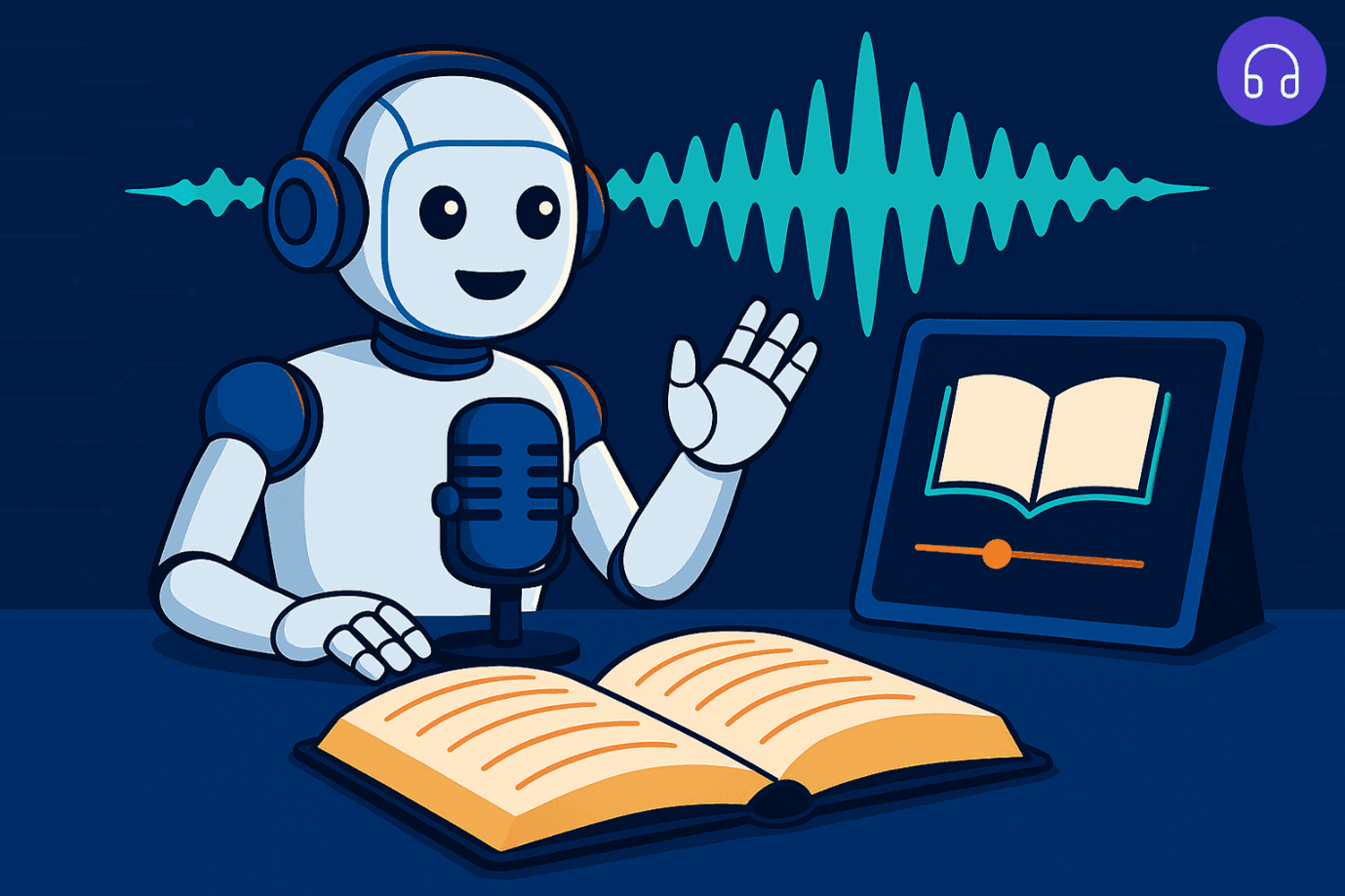Imagine browsing audiobooks and finding your favorite novel narrated by the author. Even though they passed away decades ago. Or discovering that bestseller now available in perfect Hindi, Tamil, or any native language.
This isn't science fiction. AI voice cloning is revolutionizing audiobooks. And the transformation is happening now.
What started as niche technology is now a game-changer. The audiobook market is exploding with billions in revenue globally. But traditional narration slows things down and makes it harder for everyone to access content.
Many authors struggle with this challenge. They write brilliant books but can't afford quality narration. Their stories remain trapped in text while readers crave audio versions.
Enter voice cloning technology. Digital innovation that's transforming audiobook creation.
The Voice Cloning Revolution: More Than Tech Magic
What is AI voice cloning and how does it work?
It's a digital twin of someone's voice. Deep learning and speech synthesis analyse audio samples. They create models that generate realistic speech matching the original speaker.
Think of teaching a computer vocal patterns, tones, and unique characteristics. Many cloned voices are now indistinguishable from real ones. The technology is remarkable.
Traditional audiobook production is expensive, time-consuming, and complex. You need professional narrators, studio time, editing, and months of work. A single audiobook can take 6-8 weeks to complete. That's assuming you find the right narrator who captures your vision.
Authors often spend $2,000 - $5000 on narration for a 10-hour audiobook only to realize the voice doesn't match their characters. Starting over means doubling costs and delaying launch by months. AI voice cloning for audiobooks cuts through this complexity instantly.
Breaking Down Barriers: Why Voice Cloning Makes Sense
Audiobook production has always made publishing complex. Independent authors wait months for narrators, often getting mismatched results. Publishers sit on foreign-language content they can't afford to adapt.
Here's a common frustration: brilliant stories remain inaccessible simply because narration costs are high. A thrilling novel that could captivate millions sits on shelves because the author can't afford a $3,000 narration budget.
Multilingual voice cloning addresses this challenge. Advanced systems support multiple languages and accents with sufficient data training. Consider releasing your book simultaneously in English, Spanish, Mandarin, and Hindi, same narrator's voice, perfectly adapted.
The economics are compelling. AI voice cloning for podcasts and audiobooks reduces costs by 90% while maintaining quality.
The Content Creator's Toolkit
How can you clone your own voice? The process is straightforward:
- Record your audio samples (just minutes of clear speech)
- Upload to a voice cloning platform like AudioPod AI.
- Let AI process your vocal patterns
- Generate your digital voice clone ready for narration
- Use the text to speech feature to generate required content.
How much data is needed to clone a voice accurately? Most modern systems work with as little as 10 seconds to 2 minutes of quality audio. More data improves accuracy.
The Technology Behind the Magic
AI voice cloning uses sophisticated algorithms to understand not just what you say, but how you say it. These systems analyze:
- Vocal and pitch patterns
- Speaking rhythm and pacing
- Emotional inflections
- Breathing patterns and pauses
- Accent and pronunciation characteristics
Result? Synthetic voices capturing human expression beyond traditional text to speech.
Real-World Applications
For Authors and Publishers
Authors can narrate their books without spending weeks in studios. Publishers can create audiobook versions of entire backlists without hiring dozens of voice actors.
Can you use AI voice cloning for commercial projects? Yes. Many platforms offer commercial licenses for branding, marketing, and professional media.
For Education
Educators can generate voiceovers for tutorials, e-learning courses, or training videos without spending hours recording.
For Accessibility
AI voice cloning opens doors for people with speech impairments or reading difficulties. Instead of robotic or generic voices, AI can now create personalized voices.
Top Voice Cloning Platforms
The technology advances rapidly. These platforms constantly improve, with last year's "good enough" voices now becoming "indistinguishable from human." Innovation happens monthly, not yearly.
The Ethical Landscape
What are the ethical concerns with AI voice cloning? The technology raises questions about consent, misuse, and transparency.
Concerning examples exist. Voice clones created without permission. These issues demand serious attention from the industry.
Key ethical considerations:
- Explicit consent from voice owners
- Clear disclosure when using synthetic voices
- Protection against fraud and impersonation
- Transparency in commercial applications
How can you protect your voice from being cloned? Use privacy measures. Avoid sharing extensive voice recordings publicly. Stay informed about voice protection technologies. Some platforms develop "voice watermarking" to identify synthetic speech.
The Future Soundscape
Real-time AI voice cloning enables live audiobook creation. AI voice cloning makes gaming more immersive by creating realistic character voices. Celebrity voice cloning (with authorization) brings beloved voices to new stories.
Technology is evolving towards:
- Emotional intelligence: Voices adapting tone to story context
- Interactive audiobooks: Listeners choose narrator styles
- Collaborative creation: Authors and AI working together
- Global accessibility: Breaking language barriers in real-time
The Bottom Line
Voice cloning isn't replacing human narrators, it's expanding audiobook possibilities. We're moving toward a future where every book can have an audiobook version. Authors maintain creative control over vocal presentation. Language barriers dissolve.
The technology respects human artistry while democratizing professional-quality narration. For content creators, podcasters, and authors, it's a creative multiplier. It's leveling the playing field between major publishers and independent creators.
A solo author anywhere in the world can now compete with major publishing houses in audiobook quality. That's revolutionary.
AI voice cloning security measures improve. Ethical frameworks develop. The quality gap between synthetic and human voices narrows.
The audiobook revolution is here. It sounds exactly as the creators envision it.
Ready to explore voice cloning for your next audiobook project? Start with your own voice sample. The future of storytelling is finding its voice, and it might sound like yours.

